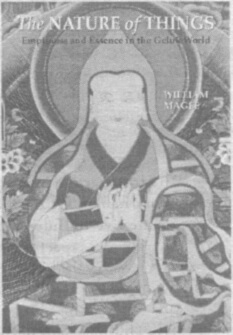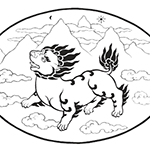| The following article is from the Spring, 1950 issue of the Snow Lion Newsletter and is for historical reference only. You can see this in context of the original newsletter here. |
Emptiness and Essence in the Geluk World

by William Magee
244 pp., 6 x 9, #NATH $22.95
Available Now!
ξ
The discussion of nature pursued in this book begins with Nagarjuna (first century), founder of the Middle Way School, who refuted a fabricated nature in his Treatise on the Middle in the Analysis of Nature chapter. In that seminal text he puts forth the three basic criteria for nature: it must be something that is non-fabricated, independent, and immutable. Nagarjuna does not explain whether he is speaking of an existent nature, but Candrakirti (sixth century), considered by many to be the founder of the Consequence School, explicitly identifies the triply-qualified nature as emptiness, the reality nature.
In order to give you the full scope of The Nature of Things, we are including the book's table of contents.
THE NATURE OF THINGS
Table of Contents
| Conventions | viii | |
| Abbreviations | - æŒæx | |
| PART ONE: THE NATURE OF THINGS | ||
| 1. | Emptiness and Essence | - æ13 |
| Introduction | - æ13 | |
| Emptiness in the Middle Way School | - æ19 | |
| 2. | Nature in the Consequence School | - æ25 |
| The Meanings of Nature | - æ25 | |
| The Scriptural Sources for Nature | - æ29 | |
| NÛgÛrjuna: the Art of the Treatise | - æ33 | |
| Treatise on the Middle Chapter XV | - æ35 | |
| 3. | Existent Natures | - æ37 |
| Does the Triply-qualified Nature Exist? | - æ37 | |
| Does the Reality Nature Exist? | - æ41 | |
| The Reality Nature Exists Conventionally | - æ49 | |
| The Reality Nature Endowed with the Three Attributes | - æ54 | |
| 4. | Natures That Do Not Exist | - æ64 |
| What It Means To Exist | - æ64 | |
| Twofold Division of the Object-to-be-negated | - æ76 | |
| Refuting a Fabricated Nature | - æ79 | |
| Heat Is Not the Nature of Fire | - æ83 | |
| Categorization of the Three Attributes Into Entity, State, and Certification | - æ87 | |
| Confusing a Nature of Things Having the Three Attributes with That Which Is To Be Negated | - æ88 | |
| Dzong-ka-ba's Identification of the Object-to-be-negated | - æ91 | |
| Innate Versus Artificial Ignorance: Refuting That the Three Attributes Are the Object-to-be-negated Nature | - æ95 | |
| Modern Scholars on NÛgÛrjuna's Triply-qualified Nature | 100 | |
| The Independent and Positive Nature | 103 | |
| Dí_l-bo's Synthesis | 104 | |
| Refuting the Independent and Positive Nature | 109 | |
| 5. | NÛgÛrjuna and His Detractors | 116 |
| Trivializing NÛgÛrjuna | 116 | |
| NÛgÛrjuna Is Not Primarily Concerned With Refuting Opponents' Views | 117 | |
| NÛgÛrjuna Does Not Employ Axioms but Rather the Putative Consequences of Inherent Existence | 120 | |
| NÛgÛrjuna Does Not Use the Term svabhÛva in Several Different Senses | 125 | |
| Conclusions | 127 | |
| PART TWO: TRANSLATIONS OF THE TEXTS | 131 | |
| Document One: NÛgÛrjuna's Treatise on the Middle | ||
| Chapter XV: The Analysis of Nature | 134 | |
| Document Two: Candrakirti's Clear Words | ||
| Chapter XV: The Analysis of Nature | 141 | |
| Document Three: Dzong-ka-ba's Ocean of Reasonings | ||
| Chapter XV: The Analysis of Nature | 159 | |
| I. Explaining the Text of the Chapter | 160 | |
| Refuting That Things Exist By Way of Their Nature | 161 | |
| Indicating Damage to Existence By Way of an Object's Nature | 171 | |
| Indicating That if One Propounds Existence by Way of Nature, One Does Not Pass Beyond Holding an Extreme | 173 | |
| II. Conjoining This With Scriptures of Definitive Meaning | 177 | |
| III. Condensing the Meaning and Indicating the Title | 178 | |
| Document Four: Dzong-ka-ba's Great Exposition of the Stages of the Path: The Refutation of an Identification of the Object-to-be-negated That Is Too Narrow | 179 | |
| First, Refuting the Assertion That the Object-to-be-negated Is That Which Possesses the Three Attributes | 179 | |
| Second, In Our System the Nature Possessing the Three Attributes Is Emptiness | 185 | |
| Third, Refuting the Assertion That Reality Is Independent and Positive | 190 | |
| Document Five: Four Interwoven Annotations : | ||
| The Refutation of an Identification of the Object-to-be-negated That Is Too Narrow | 193 | |
| First, Refuting the Assertion That the Object-to-be-negated Possesses the Three Attributes | 194 | |
| Second, In Our System the Nature Possessing the Three Attributes Is the Mode of Subsistence, Emptiness | 204 | |
| Third, Refuting the Assertion That Reality Is Independent and Positive | 217 | |
| Translation Equivalents | 221 | |
| Bibliography | 229 | |
| Index | 242 | |

